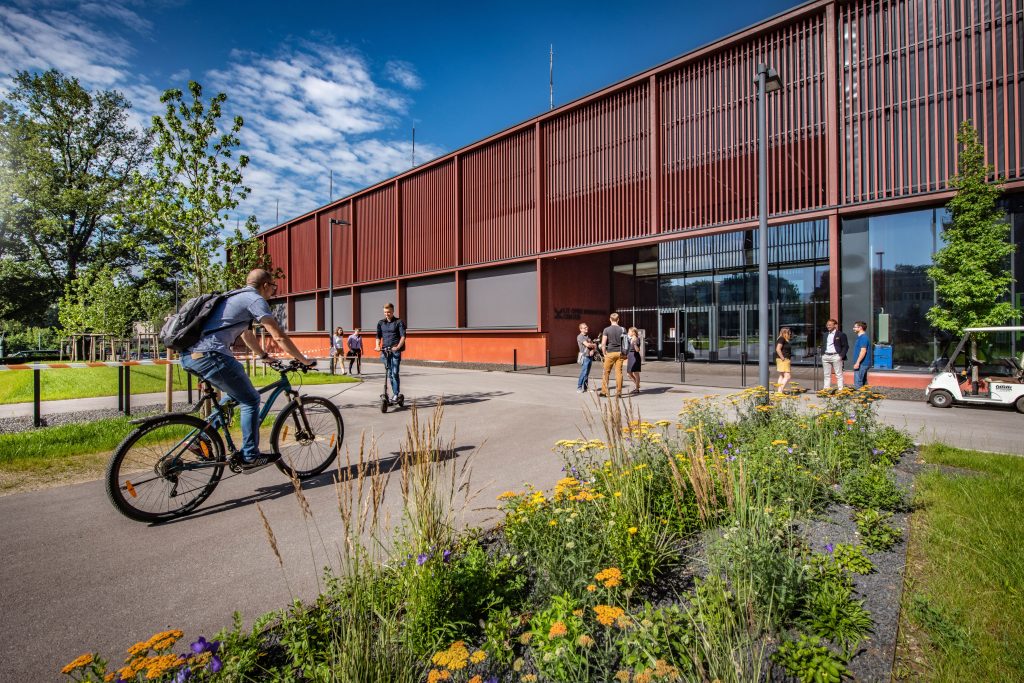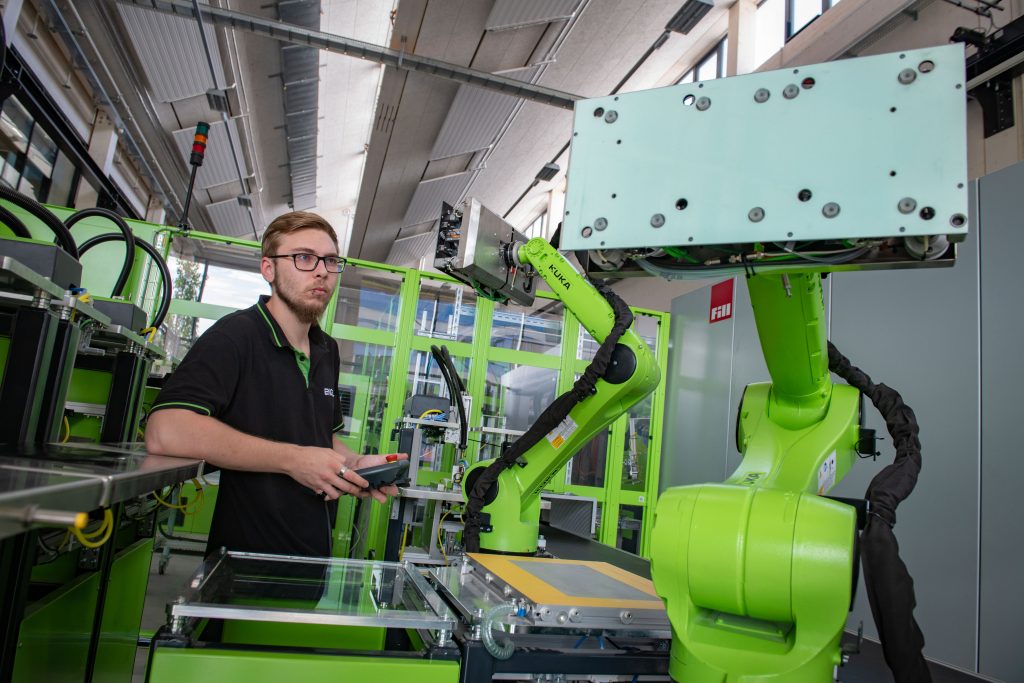
FOSTERING A CULTURE FOR COLLABORATION AND ENTREPRENEURSHIP AT THE LIT OIC: THE IMPORTANCE OF COMMUNITY ENGAGEMENT AND BUILDING TRUST
1.Introduction
In recent years, there has been a shift at universities towards focusing on their „Third Mission“, which involves using their knowledge and resources to contribute to society and address real-world challenges and needs (Compagnucci et al 2020). Particularly, the recent financial, the health, and the ecological crises have highlighted the urgency of fostering the bridges between science and society in order to find new innovative solutions. The development of the COVID-19 vaccine by BioNTech in 2020 is a prime example of successful knowledge transfer. Collaboration between industry and universities, a combination of basic and applied research, and public funding played key roles in the rapid progress here.[1]
In addition to addressing societal challenges, the Third Mission of universities can also contribute to local development by nurturing a culture of innovation and entrepreneurship in the region and by supporting the development of new technologies and businesses and driving economic growth. The Third Mission is also a central focus of the Austrian University Development Plan for 2022-2027, specifically in System Goal 5, „Expansion of knowledge and innovation transfer as well as locational advantages“.
(BMBWF 2019, 6). The strategic focus on knowledge and innovation transfer in the state of Upper Austria was one of the reasons for the JKU Linz to establish the LIT OIC, as a dedicated knowledge transfer center within the interdisciplinary Linz Institute of Technology (LIT).
[1] This achievement can be traced back to a preliminary study conducted in a collaborative research project at the University of Mainz 15 years ago, as well as other work on mRNA vaccination from the 1990s, both of which were publicly funded by the German Research Foundation.
2. The LIT Open Innovation Center
2.1. Supporting Knowledge and Technology Transfer at the LIT OIC
In 2019, the JKU Linz established the LIT OIC with the main goal of supporting and promoting a culture for innovation and entrepreneurship within the university and wider community. The LIT OIC is designed to facilitate the exchange of knowledge and technology transfer between academia and business, supporting the university’s mission of advancing knowledge. JKU Linz has two main university-wide strategic research foci: Digital Transformation and Sustainable Development (JKU 2021). The LIT OIC aligns with these foci by conducting interdisciplinary and transdisciplinary research in various fields, including Artificial Intelligence, Law, Robot Intelligence, IT Security, Information Electronics, Psychology, Industry 4.0, and Circular Economy. Dedicated inter- and transdisciplinary research groups, so called LIT Research labs have been established to bring together experts from different scientific fields to work on complex problems. The center also provides small and medium-sized, as well as public companies with easy access to university expertise. At the same time, the LIT OIC provides researchers with the opportunity to apply their knowledge in real-world settings and to collaborate with industry partners. To achieve this goal, the LIT Factory as part of the LIT OIC has been built. The LIT Factory is an Austrian testing Pilot Plant for Smart Process Engineering and Production, where university institutes companies conduct interdisciplinary research ranging from polymer production to recycling to support and improve sustainability along the entire value chain.
Located on the JKU campus, the LIT OIC is home to most of the LIT Research Labs and the LIT Factory as well as more than 25 business and industry partners and 20 startups. Companies and startups can rent work desks at the LIT OIC through membership contracts. The operations of the building are supported by the service departments of the university and managed by the separate limited liability company OIC GmbH, which is owned by the JKU Linz (50%) and the Bundesimmobiliengesellschaft GmbH (50%).[1]
The LIT OIC has three main goals that are aligned with its mission:
- Facilitating knowledge transfer: The center is committed to providing events that facilitate the transfer of knowledge and expertise. This includes hosting lectures, the so-called LIT Lectures and LIT Breakfast Briefings, that are accessible for the whole community, workshops, and other events focused on innovation and entrepreneurship, as well as providing education and training programs that help individuals develop the skills and expertise needed to succeed in today’s global economy and scientific thinking.
- Facilitating collaboration: The LIT OIC aims to facilitate collaboration with businesses, industry partners, and university research institutes through community management, partnerships, events and workshops, and support for businesses and organizations. The center offers a competitive advantage, that companies are willing to pay for.
- Supporting entrepreneurship and the creation of spinoffs: Together with the partners from university (university institute for entrepreneurship) and the local ecosystem the LIT OIC aims to build an entrepreneurship culture on campus. The center organizes and hosts workshops, national and international pitch competitions, and other events focused on entrepreneurship and innovation, such as the „Idea Hour“ series, which provides a platform for students and researchers to present their ideas and receive feedback from experienced founders and mentors. The center also works closely with tech2b, a local and publicly funded institution that offers incubation and acceleration programs to help early-stage startups and teams with legal and business expertise, professional counseling, and connecting entrepreneurs with mentors and investors.
[1] More information on the company purpose, ownership structure and partners is online available via www.jku.at/oic.
2.2.Design and Features of the LIT OIC Building
The building is Austria’s largest university-related coworking space, with 2 floors and more than 8,000m² in size. It includes several laboratories, a pilot factory for polymer production and recycling, a clean room, and an open space with more than 240 work desks. The goal was to create a new working environment that promotes innovation and collaborative working, inspired by international best practices. To achieve this, the architects designed an open space similar to a coworking space with specific features that support collaboration and exchange of ideas:
The LIT OIC has various adaptable work spaces, meeting rooms, communal areas on each floor, advanced technology infrastructure and amenities to create a comfortable and supportive work environment. The open space area with standing, adjustable desks, quiet areas, phone booths and spaces for specific types of work, can be reconfigured to support different work styles, fostering collaborations. The communal areas such as coffee kitchens, relaxation areas, meeting lounges, and outdoor spaces with seating, foster socializing, collaboration, and the exchange of ideas. The technology infrastructure such as high-speed internet, videoconferencing facilities and specialized laboratories and research facilities, further enhance the work experience. The LIT OIC center offers amenities such as a barista coffee maker, beer dispenser, and changing rooms with showers and a supermarket is located nearby. It is easily accessible by public transport, bike, and car, with bike storage, car charging stations and ample parking available.
3.Building an innovation and entrepreneurship culture
What is needed to foster points of contact between science and business and how can long-lasting, trustworthy, and mutually beneficial collaborations be established? At the LIT OIC, researchers and students from research labs of the JKU Linz work alongside small and medium-sized businesses, startups, and industry partners. The center is home to more than ten LIT research labs, around 20 early-stage startups and medium-stage startups, and over 25 corporate partners. These partners form a diverse and dynamic community with over 500 members with various academic backgrounds, motivations, and cultures. At the LIT OIC, creating a culture that supports innovation and entrepreneurship requires a range of strategies and approaches.
3.1.The LIT OIC’s Strategies for Building Trust and Encouraging Participation
Building a strong, cohesive community based on strong relationships and a sense of belonging among members is essential for promoting knowledge transfer, collaboration, and progress at a coworking space. As organizational scientist Aurore Dandoy points out, the „community self-described by coworkers through their individual experiences is part of a performative discourse. (…) That means they co-construct the community altogether, which leads to the rise of the ‚community feeling‘ (…)“. (Dandoy 2021).
However, the LIT OIC team detected two challenges at the coworking space that can hinder the building of relationships and the sense of belonging or community feeling: lack of trust and lack of participation. Lack of trust can hinder cooperation and the exchange of ideas among members, and it can be caused by a lack of transparency, open communication, and mutual understanding among members, which can make it difficult for members to share sensitive information. This problem can be exacerbated when partners have different priorities and motivations, such as a business partner focused on financial gain, while a university partner focused on advancing knowledge for its own sake. To address this challenge, it may be helpful to establish mutually-beneficial goals, to find ways to align the interests of all parties involved, and to establish clear agreements and a code of conduct that promotes fairness and accountability. Lack of participation can happen due to a lack of motivation among members. This can be caused by a lack of events, activities, or opportunities for members to engage with one another.
The LIT OIC team understands that these challenges are fundamental in coworking spaces and this is why the team places a strong emphasis on community building and relationship management. To build trust, the team establishes regular and clear communication through various channels, engages in personal contact and regular meetings with key partners, establishes clear agreements, transparent contracts, a code of conduct, fair decision-making processes and creates a supportive and inclusive environment that encourages risk-taking and experimentation. The trust-building process at the LIT OIC starts before a potential partner even becomes a member, with an onboarding process that includes an evaluation of motivations, priorities, mutual interests, and potential collaboration partners. Regular meetings are also held to discuss progress and reflect on the partnership. To encourage participation, the team encourages active engagement from all members of the center’s community, through hosting events such as dedicated community building and networking events, actively seeking feedback and input from members through personal interactions, anonymous feedback boxes, and online surveys, and also by fostering co-creation opportunities, where members can collaborate and co-create projects or initiatives together.
The LIT OIC believes that serendipity plays an important role in fostering innovation by promoting unexpected encounters and connections between members. A range of social and collaborative events facilitate strong connections between researchers and industry partners. This creates opportunities for members to interact, share ideas and knowledge, and generate new solutions. The positive and enjoyable work environment also helps build a sense of community and encourages creativity.
4.Case studies of successful knowledge transfer and entrepreneurship projects
4.1.Case study 1: Co-creating a Sustainable Future: The Student Plastics Challenge 2023
The Student Plastics Challenge 2023 is a creative event for students at the JKU initiated by the LIT Open Innovation Center and the university department for marketing in collaboration with partners from the plastic industry. The event aims to raise awareness about sustainability, which is currently one of the most important challenges facing our society. The challenges are designed to encourage students to think critically about the role of the plastic industry in achieving sustainable development goals and to explore the possibilities of implementing sustainable practices. One of the key themes discussed during the event is the issue of greenwashing, which is particularly relevant in the plastic industry, where companies may use environmentally-friendly language to market their products without actually taking any significant steps to reduce their environmental impact.

serves as an advanced platform for education, research,
and innovation. Foto: JKU Linz
Students from various technical fields such as management in polymer technologies or in chemical technologies, law and economics for technicians and chemical technologies have participated in the event and showcased their ideas on different challenges of the plastics industry.
The Student Plastics Challenge 2023 was a unique event that brought together the expertise and resources of multiple parties to create an engaging and educational experience for students. The event was co-created by a university department, the LIT Open Innovation Center, and partner companies from the plastic industry. The LIT OIC, as the organizer of the event, was responsible for coordinating the efforts of the different parties and ensuring that the event was well-structured and well-run. The university department provided the students and the academic expertise to tackle the challenges of sustainability in the plastic industry. The companies, as partners in the event, provided real-world scenarios and industry insights that helped students to gain a deeper understanding of the challenges and opportunities in this field. The event was designed to be interactive and application-oriented, encouraging participation and engagement from all members of the community.
The event also served as an opportunity for serendipitous encounters. The event brought together not only the partner companies and professors and students from different departments of the university who were interested in the field of plastic science, but also friends and family of the students who came to watch the pitching competition. The event also allowed companies to gain insight into the perspectives of young students on sustainability and the future, which can be beneficial for understanding current and future market trends and identifying potential employees.
4.2.Case study 2: From Idea to Launch: The Founders.Week Program
The Founders.Week is a highly successful program for driving entrepreneurship together with the department for entrepreneurship and the LIT Open Innovation Center. This summer school is designed for students and innovation enthusiasts who are interested in startups and want to experience entrepreneurship firsthand. The Founders.Week Program is highly integrated. It combines basic research, practical applications, interaction with the local community and startup-scene and professional trainings.
During the week-long program, participants have the opportunity to learn about a range of tools and techniques that are essential for advancing, implementing, and presenting their ideas. These topics include team speed dating, design thinking, prototyping, and business modeling, as well as pitching. In addition to learning, a key focus of the Founders.Week is on implementing ideas in teams and actively experimenting with different approaches.
One of the main benefits of the Founders.Week is that it provides students with the opportunity to meet and learn from young startups and role models in the local startup ecosystem. By interacting with these companies and hearing about their experiences, students gain valuable insights into what it takes to successfully start and grow a business. This can be especially inspiring for those who are considering starting their own businesses in the future.
In addition to meeting startups, students also have the chance to learn about the various resources and support that are available to them at the LIT OIC. This includes access to incubation and acceleration programs, as well as legal and business expertise, professional counseling, and mentorship.
There are many successful examples of students who have participated in the Founders. Week and gone on to start their own businesses at the LIT OIC. These businesses have benefited from the supportive environment and resources that are available at the center, and have gone on to achieve significant success in their respective fields.
5.Outlook
The future outlook for the LIT OIC looks bright, as the center continues to grow and evolve. The planned foundation of a new university – focused on digital sciences – to be build next to the JKU in 2023 will aid the LIT OIC in expanding its reach and impact even further. By bringing together researchers and students from a variety of disciplines and partnering with businesses, startups, and industry partners, the LIT OIC is able to facilitate knowledge transfer and collaboration on a wide range of projects. The center’s commitment to building strong relationships, fostering a sense of belonging, and encouraging serendipitous interactions will continue to drive progress and innovation in the years ahead. Looking forward, the LIT OIC is excited to see what the future holds and to continue playing a key role in the development of new technologies and businesses.
References:
Bundesministerium für Bildung, Wissenschaft und Forschung. Der Gesamtösterreichische
Universitätsentwicklungsplan 2022 – 2027, Vienna 2019. Online available: https://www.bmbwf.gv.at/Themen/HS-Uni/Aktuelles/Neuauflage-des-Gesamt%C3%B6sterreichischen-Universit%C3%A4tsentwicklungsplans-GUEP-2022-bis-2027.html
Compagnucci, Lorenzo and Spigarelli, Francesca. The Third Mission of the university: A systematic literature review on potentials and constraints. In Technological Forecasting and Social Change, vol 161, 2020.
Dandoy, Aurore (2021). Community Management Practices in Coworking Spaces: Being the ‘Catalyst’. In Mitev, Nathalie, Aroles, Jeremy, Stephenson, Kathleen A., Malaurent, Julien (eds) New Ways of Working. Technology, Work and Globalization. Palgrave Macmillan, Cham. 2021, pp. 401-427.
Johannes Kepler Universität Linz, Platz für Strategie. Der Entwicklungsplan der Johannes Kepler Universität Linz 2022-2027. Online available: https://www.jku.at/fileadmin/marketing/Daten_Marketingseiten/Entwicklungsplan_2022-2027_web_fin.pdf
Elisabeth Ulbrich

Elisabeth Ulbrich is the Head of Operations and one of the first members of the team. Having studied History and Economics, she began her career in Austria’s national bank, before moving on to help launch the center. In her current role, she oversees the day-to-day smooth running and management of the center. Additionally, she focuses on community building and fostering collaboration among members at the center, helping to build a strong sense of community.
 EN
EN